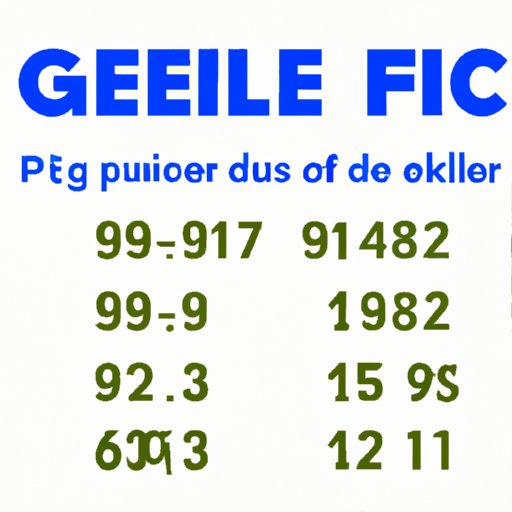
Introduction
Calculating your car’s miles per gallon is essential to monitor fuel consumption and save money on gas. In this article, we’ll explain what miles per gallon is and why it matters, provide step-by-step instructions on how to calculate it, and offer some tips for improving your car’s gas mileage. We’ll also explore the science behind fuel calculations, common mistakes people make, and some strategies for saving gas and long-term benefits.
Understanding Miles Per Gallon: A Beginner’s Guide
Miles per gallon (MPG) is the standard measurement used in the US to calculate the fuel economy or efficiency of a vehicle. It estimates the number of miles a car can travel per gallon of fuel. MPG is an important factor to consider when purchasing a car or tracking fuel expenses, as it indicates how much gas a car uses, thereby affecting operating costs and the environment. The higher the MPG, the less fuel the car consumes.
To calculate miles per gallon, you need to divide the distance traveled by the amount of gas used. The basic formula is MPG = distance traveled ÷ gallons of gas used.
5 Simple Steps to Calculate Your Car’s Miles Per Gallon
Calculating your car’s MPG is easy, and you don’t need any special tools or equipment to do it. Follow these steps:
- Fill your car’s gas tank completely and take note of the odometer reading.
- Drive your car until you need to fill the gas tank again and record the odometer reading.
- Fill the gas tank again and note the number of gallons you used.
- Subtract the first odometer reading from the second to get the distance traveled.
- Divide the distance traveled by the gallons of gas used to get your car’s miles per gallon.
You can repeat this process over several tanks of gas to get a more accurate average MPG for your car. To get more precise results, avoid rounding off the numbers and try to fill your tank to the same level every time.
Tricks to Improve Your Car’s Gas Mileage And Save Money
Improving your car’s gas mileage not only saves you money but also reduces emissions and helps the environment. Here are some common tricks for maximizing your car’s fuel efficiency:
- Reduce unnecessary weight in your car.
- Keep your tires inflated to the recommended pressure.
- Drive at a steady pace and avoid sudden acceleration or braking.
- Use cruise control on the highway.
- Avoid idling for long periods.
- Regularly maintain your car, including oil changes and tire rotations.
- Avoid driving at high speeds or aggressive behavior.
These tricks work because they reduce drag, friction, and energy loss, leading to less fuel consumption. They also help improve your car’s performance and longevity.
How to Calculate Miles Per Gallon: Tips for Accurate Results
While calculating MPG is simple, some common mistakes can affect the results. Here are some tips for getting more accurate results:
- Avoid topping off your tank or adding fuel too soon after filling up.
- Use the same gas station and fuel octane rating.
- Drive on similar roads and in similar weather conditions.
- Fill the tank to the same level every time.
- Calculate MPG over several tanks of gas to get an average.
- Use a mobile app or hybrid car system to track your fuel consumption.
Determine Your Car’s Fuel Efficiency: Its Importance & How to Calculate it
Fuel efficiency is another measure of a car’s performance and environmental impact. It shows how much energy a car converts into motion and how much is wasted as heat or noise. Unlike MPG, which measures how far a car travels per gas used, fuel efficiency measures how much work a car does per unit of energy consumed. To calculate fuel efficiency, you need to divide the distance traveled by the amount of fuel energy used, usually measured in joules or BTUs.
The Science Behind Fuel Calculations: Miles Per Gallon Accuracy Explained
Calculating MPG is not an exact science and can be affected by various factors, such as driving conditions, fuel quality, car model, and personal driving habits. However, there are ways to account for these variables and improve the accuracy of your calculations. One way is to use EPA’s fuel economy ratings, which provide estimated MPG values based on standardized tests. These values can serve as a baseline for comparing different cars or driving modes. Another way is to use advanced tools or sensors, such as OBD-II scanners or flow meters, to monitor fuel consumption in real-time. These tools can provide precise data and help detect any issues or inefficiencies in your car’s fuel system.
Top Fuel-Saving Strategies: Beyond Calculating and Maximizing Miles Per Gallon
In addition to calculating and improving your car’s miles per gallon, there are other strategies you can use to save gas and reduce your carbon footprint. Some of these include:
- Carpooling, biking, or walking instead of driving alone.
- Using public transportation or fuel-efficient cars.
- Switching to renewable fuels, such as electricity, hydrogen, or biofuels.
- Using eco-driving techniques, such as coasting, drafting, or regenerative braking.
- Supporting renewable energy and energy-saving policies.
These strategies have long-term benefits for the environment and can help reduce our dependency on fossil fuels.
Conclusion
Calculating your car’s miles per gallon is crucial to monitor fuel consumption, save money, and reduce emissions. By following the steps and tips provided in this article, you can get more accurate results and improve your car’s fuel efficiency. Beyond maximizing MPG, there are other fuel-saving strategies you can use to contribute to a cleaner and greener future. We encourage you to share this knowledge and take action to reduce your carbon footprint and support sustainable transportation.




